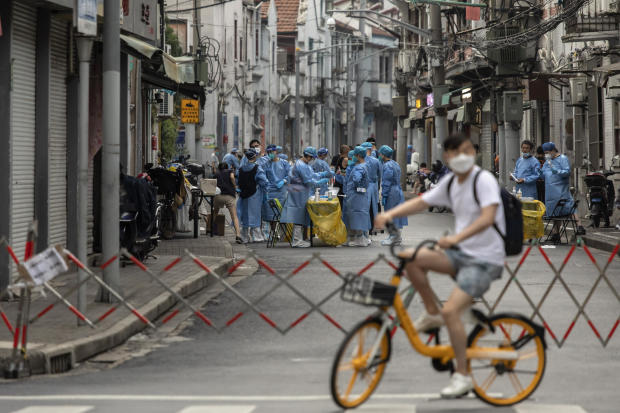Beijing: Authorities in southern China have apologized for breaking into the homes of people who had been moved to a quarantine hotel in the latest example of strong virus prevention measures which have caused a rare public reaction. State media said 84 homes in an apartment complex in Guangzhou city’s Liwan district had been opened in an effort to find any “close contacts” hiding inside and to disinfect the premises .
The doors were later sealed and new locks installed, the Global Times newspaper reported.
The Liwan district government apologized on Monday for the “oversimplified and violent” behavior, the newspaper said. An investigation has been launched and “relevant persons” will be severely punished, he said.
China’s leadership has maintained its hard-line “zero-COVID” policy despite mounting economic costs and disruption to the lives of citizens, who continue to undergo routine testing and quarantines even as the rest of the world has opened to live with the disease
Numerous cases of police and health workers entering homes in China in the name of anti-COVID-19 measures have been documented on social media. In some, doors have been broken down and residents have been threatened with punishment, even when they have tested negative for the virus.
Authorities have required keys to lock out residents of apartment buildings where cases have been detected, steel barriers erected to prevent them from leaving their compounds and iron bars welded over doors.
China’s communist leaders exercise tight control over the government, the police, and the levers of social control. Most citizens are used to the lack of privacy and restrictions on freedom of expression and the right to assembly.
Qilai Shen/Bloomberg/Getty
However, strict anti-COVID-19 measures have tested that tolerance, especially in Shanghai, where a ruthless and often chaotic lockdown spurred online and in-person protests among those unable to access food, health care and goods. first need
Authorities in Beijing have taken a softer approach, worried about sparking unrest in the capital ahead of a key party congress later this year, at which President and party leader Xi Jinping is expected to received a third five-year term amid dramatically slower economic growth and high unemployment among university graduates and migrant workers.
The requirement that only vaccinated people be allowed into public spaces was quickly canceled last week after city residents complained that it had been announced without warning and unfairly treated those who had not been vaccinated.
“Zero-COVID” has been justified as necessary to prevent a wider outbreak among a population that has had relatively little exposure to the virus and less natural immunity. While China’s vaccination rate is around 90%, it is considerably lower among the elderly, while questions have been raised about the effectiveness of vaccines produced in China.
Although China’s Fosun Pharma reached an agreement to distribute and eventually manufacture the mRNA vaccine manufactured by Pfizer and BioNTech, it has not yet been cleared for use in mainland China, despite being authorized for use by separate authorities in Hong Kong and Macau.
Studies have consistently shown that inoculation with mRNA vaccines provides the best protection against hospitalization and death from COVID-19. Chinese vaccines made with older technology were quite effective against the original strain of the virus, but much less so against newer variants.
Now health experts say the delay in approval of mRNA vaccines, a consequence of putting politics and national pride above public health, could lead to preventable deaths from the coronavirus and deeper economic losses .
China’s national borders remain largely closed, and while domestic tourism has increased, travel across the country remains subject to a range of regulations, with quarantine restrictions constantly changing.
In a recent incident, around 2,000 visitors to the southern tourist hub of Beihai were forced to extend their stays after more than 500 cases were found and were banned from leaving.
The local government was scrambling to find hotel rooms for those who had already prepared to return home, while hotels and airlines provided refunds for those who had booked city breaks that were due cancel.
China regulates travel and access to public places through a health code app on citizens’ smartphones that must be updated with regular testing. The app tracks a person’s movements as a form of contact tracing, allowing for the additional imposition of public tracking.
The measures remain in place despite relatively low infection rates. The National Health Commission announced on Tuesday only 699 new cases of domestic transmission detected in the previous 24 hours, most of which were asymptomatic.
Month
[ad_2]
Source link






